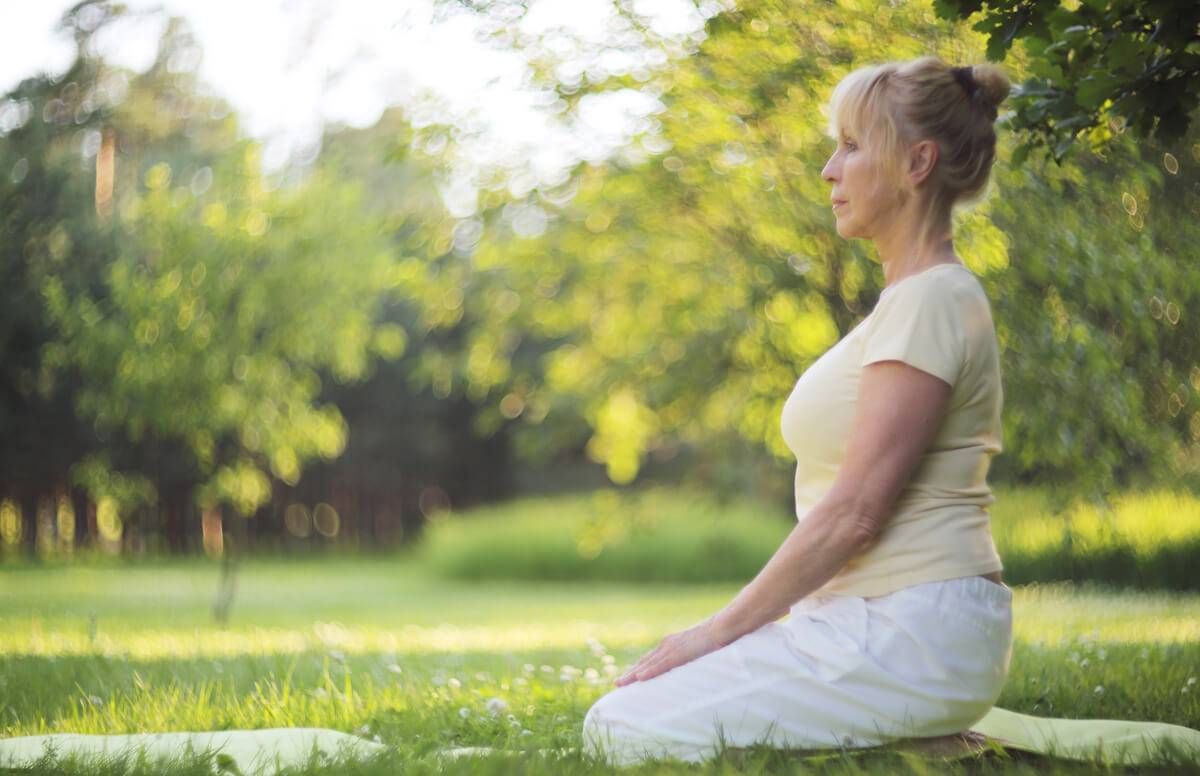How Mindfulness May Reduce Menopausal Symptoms
A Mayo Clinic study points to a viable, non-pharmacological treatment
Have you taken a few minutes lately to stop what you’re doing, unplug from your electronic devices and just focus on your breathing? If you’re a woman who is going through menopause or will be in the near future, this basic, beginning practice of mindfulness could help you reduce menopausal symptoms, according to a recent Mayo Clinic study.

In the study, recently published in Climacteric: The Journal of the International Menopause Society, Mayo researchers found that women with a high level of mindfulness had fewer menopausal symptoms. This was true both for the psychological symptoms, such as depression and anxiety, as well as physical symptoms, like hot flashes and bladder issues -- although there was a much stronger correlation with the psychological symptoms. The research also found a correlation between lower stress and fewer menopausal symptoms. The study involved 1,744 women age 44 to 65 who received care at Mayo’s Women’s Health in Clinic in Rochester, Minn.
Mindfulness is a mental state in which you are conscious or aware of the present moment. People vary in their natural tendencies to be mindful; however, it can be learned through practice. This involves taking time to focus your mind only on the present while acknowledging and accepting your feelings, thoughts and physical sensations. The practice of mindfulness is well known in the U.S., and today, there are many ways to learn it, including online resources and group classes.
Mindfulness Research Pointed to the Menopause Relationship
Mayo Clinic general internist and women’s health specialist Dr. Richa Sood and her fellow researchers became interested in the effects of mindfulness on menopausal symptoms after exploring prior studies connecting the practice with stress reduction. Also, the researchers noted that a prior study involving a small group of women found that a structured practice of mindfulness decreased menopausal symptoms. In addition, guidelines from the North American Menopausal Society suggest cognitive behavioral therapy and clinical hypnosis as treatment options for women who are not interested in pharmacological options.
“So, there were a lot of different pointers that suggested there is something to be seen here of the connection of mindfulness with menopause, independent of everything else,” Sood says.
The Mayo research subjects completed a 15-item questionnaire to measure their level of mindfulness. It included statements such as “I forget a person’s name almost as soon as I’ve been told about it” and “I seem to be running on automatic without much awareness of what I’m doing.” The women rated the statements on a six-point scale, from “1 -- almost always” to “6 -- almost never.” The subjects also took questionnaires measuring their stress levels and the kinds of menopausal symptoms they had.
The strongest correlation in the study was between mindfulness and psychological symptoms; high mindfulness was associated with fewer problems like depression, anxiety and irritability.
Sood cautions that the study was associative, not causal. It found associations between mindfulness and menopausal symptoms; it wasn’t designed to find direct cause. However, because the study involved a large number of women and found significant correlations, there is reason to believe there could be causal correlations, she says, adding that she and her colleagues plan to do more studies on the topic.
“It’s very exciting, knowing that mind-body techniques have worked for menopausal symptoms; I think it’s very exciting, building on what we already know,” she says.
It's Primarily About Reducing Stress
Natalie Dattilo, director of psychology at Brigham and Women’s Hospital in Boston, says she was not surprised by the results of Mayo’s research. Dattilo has studied mindfulness for about 10 years and uses the practice herself, and to help her patients.
“The benefits are so far-reaching and can be generalized to any number of problems, struggles or symptoms that people are having,” Dattilo says. “The mechanism, primarily, is in stress reduction. So, if you’re stressed out, and that could be for any number of reasons — life stress, physical health stress, caregiver stress — it’s a good tool to have. The benefits of stress reduction are not only psychologically helpful, but physically helpful, too.”
Mindfulness helps people feel better in stressful situations because it allows you to pay attention to what is happening in the moment and thereby have more control of your situation, Dattilo says.
The fact that the Mayo study found associations between mindfulness and physical symptoms has interesting implications for studies on the mind-body connection, she adds. “I was pleased to see that there was a positive association and that mindfulness was found to be helpful, because I think that just offers more tools for women who are struggling in any variety of ways,” Dattilo says.
Researchers Expected Stronger Correlation With Hot Flashes
Sood says the researchers had expected they would find a stronger correlation between mindfulness and probably the most talked about menopausal symptom: hot flashes. But she has at least one theory about why that correlation wasn’t stronger.
“There is some research that supports that hot flashes and night sweats by themselves are not the full big picture,” she says. “The personality type that sits behind is very important as well. Some women can have these symptoms and make nothing of those, while others can have a very intense response to the symptoms. So, how women perceive these is important, and that can play into why we didn’t see that correlation.”
How to Practice Mindfulness
If you’re interested in learning more about mindfulness and possibly trying it, a quick Internet search turns up many resources, including dozens of YouTube videos that offer guided practice sessions. Also, mindfulness-based stress reduction classes have become fairly common, offered by meditation and yoga centers and community centers.
If you’d prefer, you can also start simply on your own.
“It’s not a difficult technique to just begin to practice on your own if you have a few basic strategies,” Dattilo says. “Like just sitting in one spot, basically, kind of unplugging from everything and taking some deep breaths, and just kind of thinking about that. Noticing how that feels and just turning your attention to what it feels like as you’re breathing. Some people can find that a little challenging, but when you just focus on one thing, you’re training your brain to narrow its focus and you get to practice having some control over that.”


